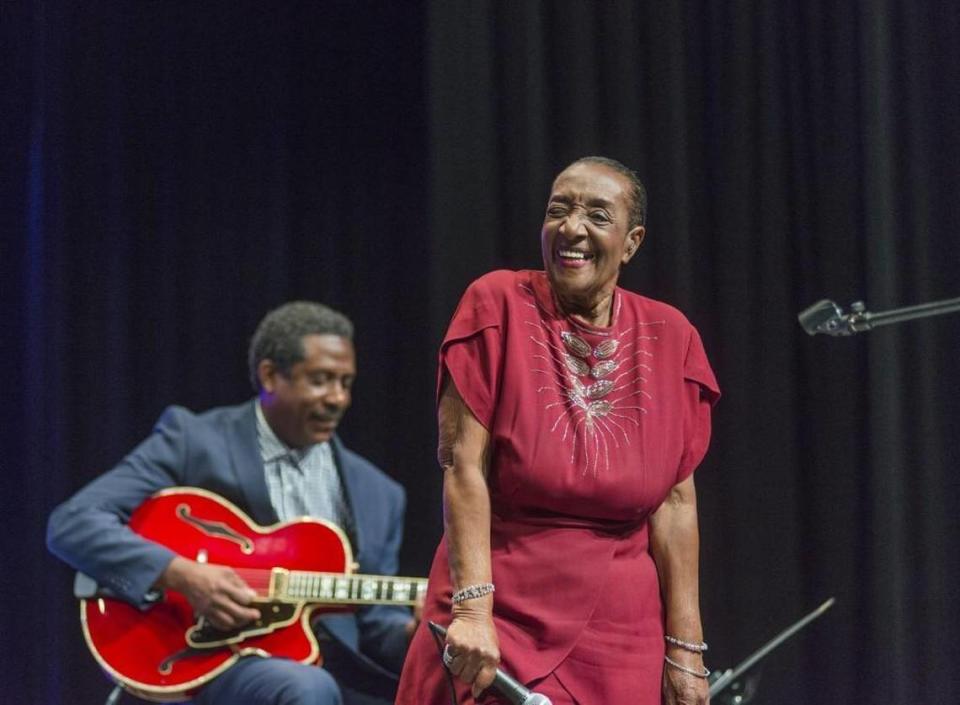KC jazz legend Queen Bey-Blythe died last month. She was known for more than her music
Your Guide to KC: Star culture and identity writer J.M. Banks is acting as a tour guide of sorts to some well-known and hidden gems, with a focus on Kansas City’s communities of color. Send your ideas to jbanks@kcstar.com.
She was known as “Kansas City’s Ambassador of Jazz” and shared the stage with legends like B.B. king and Earl Garner. Queen Bey-Blythe, a prolific jazz singer and beloved figure in Kansas City music died April 22 at her home in Los Angeles.
Born in 1937, (according to some online reports), in Kansas City, Bey-Blythe became enthralled with music at an early age, writing her first songs by the age of 12. Being raised in the golden era of KC jazz, Bey-Blythe started to listen to the legendary singers of her day like Diana Washington and Ella Fitzgerald and envisioned a life of herself on stage.
Kansas City has long held a significant place within the history of American jazz music. In the 1940s the city began to be a hub for aspiring jazz musicians looking to hone their skills and make a name for themselves among a community of talented artists. The jazz clubs of Vine Street like the iconic Blue Room became one of the premier locations highlighting the best musicians from all over including Charlie Parker, Max Roach and Count Basie.
Bey-Blythe stood toe to toe with those greats and helped to infuse jazz into the cultural roots of the city.
In addition to her numerous years as a musician and performer, Bey-Blythe’s talents also extended to education, theater and film.
Kevin Willmott, an Oscar-winning director and screen writer, knew Bey-Blythe since he cast her to play the role of Mama Butler in his 1999 film “Ninth Street.” Since then, Willmott, who in 2019 shared the Academy Award for Best Adapted Screenplay for “BlacKkKlansman,” with Spike Lee, has dropped Bey-Blythe into many of his films, either as a cameo or singer performing. Willmott said he feels like the singer was able to elevate even the smallest of scenes.
“She was just an artist,” said Willmott. “She could sing, write and act. She was a real entertainer in that sense. The thing I think she contributed to the jazz scene more than anything else was she was just a great entertainer.”

Bey-Blythe stood out with her earthy yet sophisticated voice that was both emotional and soulful. She became remembered as a phenomenal performer with an authentic stage presence that commanded any crowd.
Willmott, saddened by the recent death, marks himself as privileged to not only have had the opportunity to work with Bey-Blythe, but also to have formed a friendship that lasted decades. Willmott and Bey-Blythe spoke weekly. She shared stories of her life and the beauty and hardships that came along with her pursuit of her dreams.
“She would talk about the world of Kansas City jazz she grew up in. I don’t think people realize the power that KC jazz had in her time. To me she was someone in the world of Black entertainment who was involved in significant ways,”
Willmott hopes that her legacy as a figure in KC music will not be forgotten. He’s happy that although she did not have an abundance of recorded music, he was able to immortalize her in film.
“She could do a variety of things and that was a kind of secret weapon,” said Willmott. “I know I could write her in and she would deliver a great punch to the movie.”


